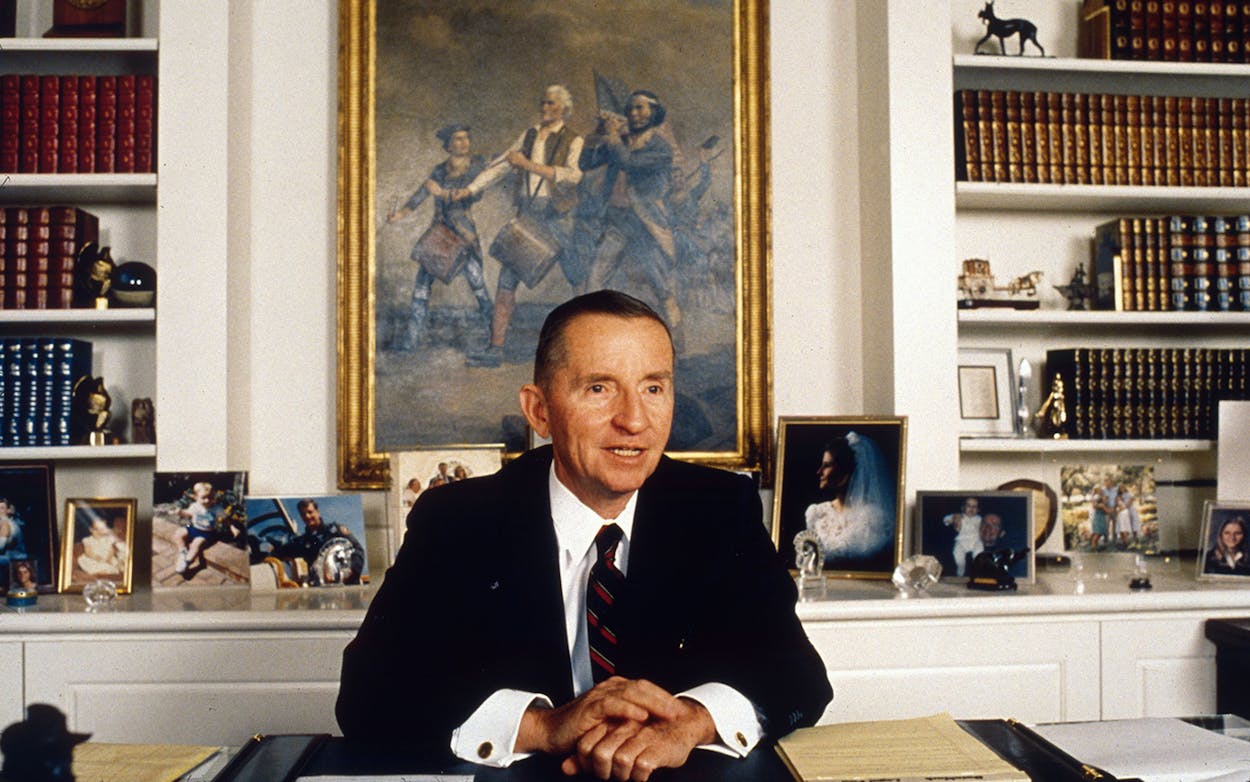H. Ross Perot died on Tuesday morning. The 89-year-old billionaire and former two-time presidential candidate had lived with leukemia since February.
A Texarkana native, Perot lived most of his life in Dallas, where he was instrumental in expanding the burgeoning field of computers in the sixties and seventies. He got his start as a salesman at IBM, before founding Electronic Data Systems in 1962. His large personality and Texas roots made him a figure of fascination in the business world. The November 1968 issue of Fortune magazine ran a story about “the fastest, richest Texan ever,” and he was the subject of a 1974 Texas Monthly feature in which author Bill Porterfield called him “a hero for our time” for his efforts—backed by tens of millions from his personal fortune—to bring home Vietnam War POWs, and compared him to Davy Crockett. Perot’s role in the dramatic rescue of two EDS employees during the Iranian Revolution in 1979 also helped turn him into a larger-than-life figure. (In the movie version of the story, Perot was played by Rambo costar Richard Crenna.)
But it was his foray into presidential politics that made Perot into a household name. Running as an independent in the 1992 election against President George H.W. Bush and Arkansas governor Bill Clinton, Perot won 18.9 percent of the popular vote, the largest share a third-party candidate had seen since Teddy Roosevelt’s Bull Moose run in 1912. His candidacy was controversial. Running as a reform-minded conservative, Perot was cast as a spoiler, disrupting Bush’s chances for reelection—a myth that Texas Monthly contributor R.G. Ratcliffe attempted to puncture in a column he wrote for the magazine late last year, after Bush’s death, arguing that the economy and his failed campaign promises are what brought the sitting president down.
Perot’s presidential run—and the subsequent follow-up in 1996, which, like most sequels, failed to capture all of the charms of the original—cemented in the minds of Americans the businessman as an American original, a true eccentric of the Texas variety. In the final paragraph of his Texas Monthly feature, Porterfield wrote, “we see him as a tilter at windmills, a beautifully bizarre man who sticks out his neck and gets it chopped off.” The rest of the country got to know his eccentricities through Saturday Night Live.
Perot made the cover of Texas Monthly four times. His third cover story, in a 1992 issue, gave a more nuanced portrait of the man than the one of popular imagination. Its author was Steve McElroy, an Austin inventor who partnered with Perot to bring biodegradable soft drink lids to market. McElroy recounted his business dealings with a man whose eccentricities masked a hardball negotiator, a hard-driving businessman who drug-tested all his employees and called off deals only to reopen them once he got the cut of a partner’s jib.
Perot’s political activities largely ended after the nineties, but he will continue to be a presence in cultural and civic life after his death through his foundation and his investments, not to mention his endowment for Dallas’s Perot Museum of Nature and Science, which took on his name after a major contribution in 2008. True originals never really fade away.
- More About:
- Politics & Policy
- Business
- Obituaries
- Ross Perot
- Dallas








